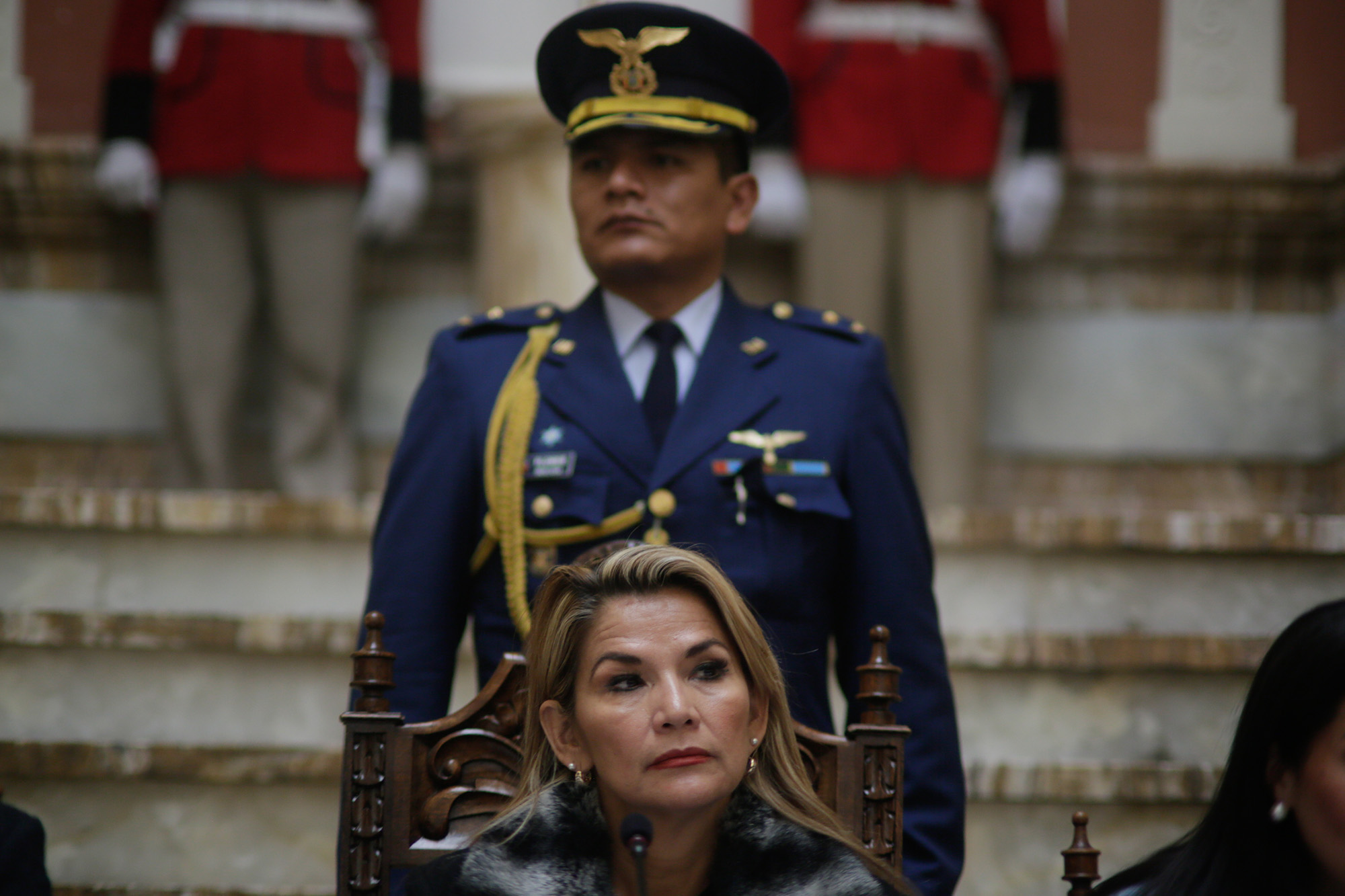De
staatsgreep in 2019 tegen de democratisch gekozen regering Morales in Bolivia
was vooral ingegeven door de ‘wereldhonger’ naar lithium, de
belangrijkste grondstof voor accu’s, niet voor niets wordt lithium
witgoud genoemd.
Declassified UK heeft een uitvoerig schrijven van Matt Kennard gepubliceerd
(door mij overgenomen van Information Clearing House) waarin
hij beschrijft welke rol Groot-Brittannië heeft gespeeld in deze
smerige coup, die zoals zo vaak werd georganiseerd en geregisseerd
door de CIA……
Overigens
stond het hele westen inclusief de reguliere media achter deze coup,
met grote graagte werden in november 2019 de leugens overgenomen van
de Organisatie van Amerikaanse Staten (OAS) als zouden de zojuist
gehouden verkiezingen in Bolivia zijn gestoken door de partij van Evo
Morales…..(zo heeft Trouw en VPRO correspondent, zijne kwaadaardigheid Edwin Koopman, fiks lopen liegen over wat er wel en niet zou zijn gebeurd in Bolivia*) Die media en politici in het westen
durfden zelfs te stellen dat er geen sprake was van een staatsgreep,
maar dat Morales zelf was opgestapt na ‘massale protesten’ (waar het
overgrote deel van het Boliviaanse volk niet aan meedeed…..),
terwijl het leger hem heeft ontvoerd en met een militair vliegtuig
deporteerde naar Mexico…..
Deze
gang van zaken geeft ten overvloede nog eens aan dat de zogenaamde
onafhankelijke (massa-) media, in handen van oligarchen en steenrijke
investeringsmaatschappijen, de neoliberale status quo propageren en
daar maar al te graag voor liegen (dat het gedrukt staat…)…..
Schande overigens dat westerse regeringen (inclusief het
disfunctionerende kabinet Rutte 3) zich achter deze coup schaarden,
immers zij moeten via hun eigen geheime diensten hebben geweten dat
e.e.a. op grove leugens was gebaseerd….. (zo niet zijn die geheime diensten geen knip voor de neus waard… oh wacht even, dat zijn ze ‘ook niet…’)
Evo
Morales was de eerste president van de oorspronkelijke bewoners nadat
witte psychopaten een paar eeuwen geleden het land innamen….. Hij
was uiterst succesvol en heeft de arme oorspronkelijke bevolking (de
meerderheid in Bolivia, dit in tegenstelling tot andere
Latijns-Amerikaanse landen) uit de armoede getrokken, heeft deze
bevolking verder onderwijs, medische zorg en zoveel mogelijk goede
behuizing gegeven. De economie draaide prima, ondanks het
nationaliseren van een aantal bedrijven door Morales, bedrijven die
tegen een appel en ei de grondstoffen van Bolivia hebben
gestolen…… (die nationalisaties waren mede een reden voor de staatsgreep)
Oké het
was voor de mensen die verder nadenken dan de neus van de westerse
media lang is al duidelijk dat hier een heel smerige staatsgreep werd
uitgevoerd en waarbij schandelijk genoeg ook nog eens een aantal
mensen van de oorspronkelijke bevolking werden vermoord door politie
en leger, echter dat in feite de regering Johnson en de geheime
dienst van Groot-Brittannië zo’n grote rol hebben gespeeld was
althans voor mij een openbaring, wat een geteisem!!
Gelukkig
heeft de partij van Morales de verkiezingen van 2020 ruimschoots
gewonnen, echter het leed wat er werd aangericht met de coup is
daarmee niet weggewist…..
Lees het
artikel van Kennard en zegt het voort, daar men in het westen nog
steeds volhoudt dat de coup van 2019 wettig was…… (hoe zot in je
kop moet je zijn om dat te beweren…..)
Revealed:
The UK supported the coup in Bolivia to gain access to its ‘white
gold’By
Matt Kennard
After
a coup in the South American country of Bolivia in November 2019,
democratically elected president Evo Morales was forced to flee.
Foreign Office documents obtained by Declassified show Britain saw
the new military-backed regime, which killed 18 protesters, as an
opportunity to open up Bolivia’s lithium deposits to UK firms.
-
Lithium
– known as ‘white gold’ – is a key metal used in batteries
and increasingly important to the world car industry -
Britain’s
Foreign Office appears to have paid Oxford-based company to optimise
‘exploitation’ of Bolivia’s lithium deposits the month after
Morales fled country -
UK
embassy acted as ‘strategic partner’ to coup regime and
organised international mining event in Bolivia four months after
democracy overthrown -
UK
firm founded by British Army veteran was ‘now in line to offer its
services’ to mining companies, Foreign Office noted after event -
UK
embassy provided data for the now discredited international report
which was used to justify 2019 coup -
UK embassy
brought cybersecurity company with close links to the CIA to Bolivia
in March 2019, eight months before the military takeover
March 09, 2021
“Information
Clearing House”
– On 10 November 2019, after the head of the army called
for his resignation, Bolivia’s socialist president, Evo Morales,
stepped down. It followed weeks of protests after the release of a
report by the Organisation of American States (OAS) alleging
irregularities in the election Morales had won the previous month.
Persecution from the
new regime forced Morales to flee
the country and an “interim president”, Jeanine Áñez, was
installed.
Widely condemned
as a coup, resulting protests were met with lethal force.
Days after taking
power, on 14 November, the Áñez regime forced through Decree
4078 which gave immunity to the military for any actions taken in
“the defence of society and maintenance of public order”.
The following day, on
15 November, Bolivian military forces shot and killed eight
protesters in the city of Sacaba. On 21 November, regime forces
killed another 10
protesters in the neighbourhood of Senkata just outside the
capital La Paz.
Despite the deadly
violence, which was condemned
by human rights groups, the British embassy in La Paz moved quickly
to support Bolivia’s new regime, Declassified
can reveal from documents we have obtained.
We have seen a project
list for a Foreign Office programme in Bolivia called “Frontline
Diplomatic Enabling Activity”, which the UK government describes as
a “small pot of money that [embassies] receive and have authority
over to spend on projects supporting [embassy] activity”.
‘Interim
President’ of Bolivia Jeanine Añez speaks during a press
conference at the presidential palace on 15 November 2019 in La Paz,
Bolivia. (Photo: Gaston Brito Miserocchi / Getty Images)
The deposits
Bolivia has the
world’s second-largest
reserves of lithium, a metal that is used to make batteries and which
has become increasingly important due to the burgeoning electric car
industry.
The UK government has
stated that lithium battery technology is a priority for its
“industrial strategy”. In June 2019, it announced
it was investing £23-million in “electric car battery
development”.
The government has
further noted: “It’s estimated that South America holds 54% of
the world’s lithium resources, which are increasingly in demand to
manufacture batteries for electric vehicles and energy
diversification programmes.”
It added: “The UK
aims to have a thriving, sustainable battery industry, which would
translate to a £2.7 billion opportunity … and our bilateral
partnerships are essential to ensure this.”
In February 2019, Evo
Morales’ government had chosen
a Chinese consortium to be its strategic partner on a new
$2.3-billion lithium project which would focus on production from the
Coipasa and Pastos Grandes salars (salt flats under which the lithium
is deposited).
But after the coup,
the regime’s new minister for mining cast doubt
on whether the deal would be honoured by the new government.
These particular salt
flats were of interest to the UK embassy.
One project it
co-funded from 2019-20 sought to “optimise Bolivia’s lithium
exploration and production (in the Coipasa and Pastos Grandes salars)
using British technology”.
After the coup, this
project was quickly moved forward.
The abstract for the
project was authorised
by its main funder – the Inter-American Development Bank (IADB) –
on 25 November 2019, two weeks after the coup and days after the
Senkata massacre.
The project gained
full approval
for funding of $100,000 weeks later, in mid-December 2019.
The IADB told
Declassified:
“The implementation of [grant] activities are conducted in close
coordination with designated government authorities and their
technical teams.” At that point its “close coordination” would
have been with the Áñez regime.
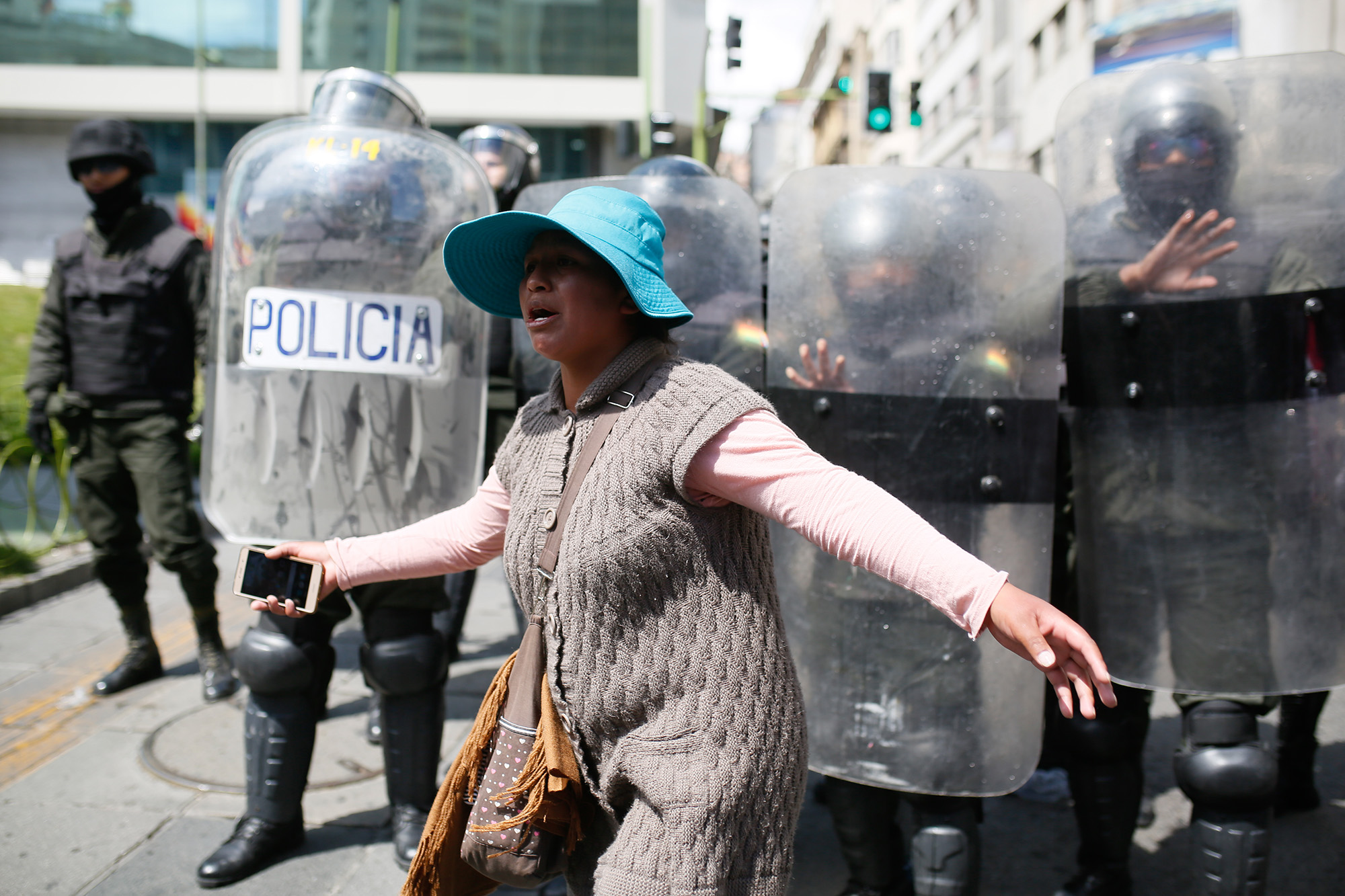
A
woman shouts anti-regime slogans in front of a police line during a
funeral procession of the victims killed during clashes with police
at the Senkata fuel plant on 21 November 2019 in La Paz, Bolivia.
(Photo: Gaston Brito Miserocchi / Getty Images)
Satellite
Applications Catapult
The British embassy in
La Paz provided £5,000 towards this lithium project in 2019-20, but
the Foreign Office refused to tell Declassified
if these funds were disbursed after the coup in November 2019.
The goal was to
“design and implement a satellite data-based application that can
optimise exploration and exploitation of large/best lithium sources
in the Coipasa and Pastos Grandes salars in Bolivia”, the documents
outlined.
The Foreign Office
noted that the project was to be implemented by Satellite
Applications Catapult, an Oxford-based organisation “helping
organisations harness the power of satellite-based services”.
The company receives
about a third
of its funding from the UK government but it did not respond to
Declassified’s
questions about the Bolivia project.
However, we found that
on 19 December 2019 – two days after the IABD gave final approval
to the project – the UK Foreign Office transferred
£33,220 to Satellite Applications Catapult, in a payment listed as
“programme spend”.
The department refused
to tell Declassified
if this funding was for the lithium exploitation project in Bolivia.
The IADB told us: “Coordination with the British Embassy has been
particularly cooperative in search for synergies”.
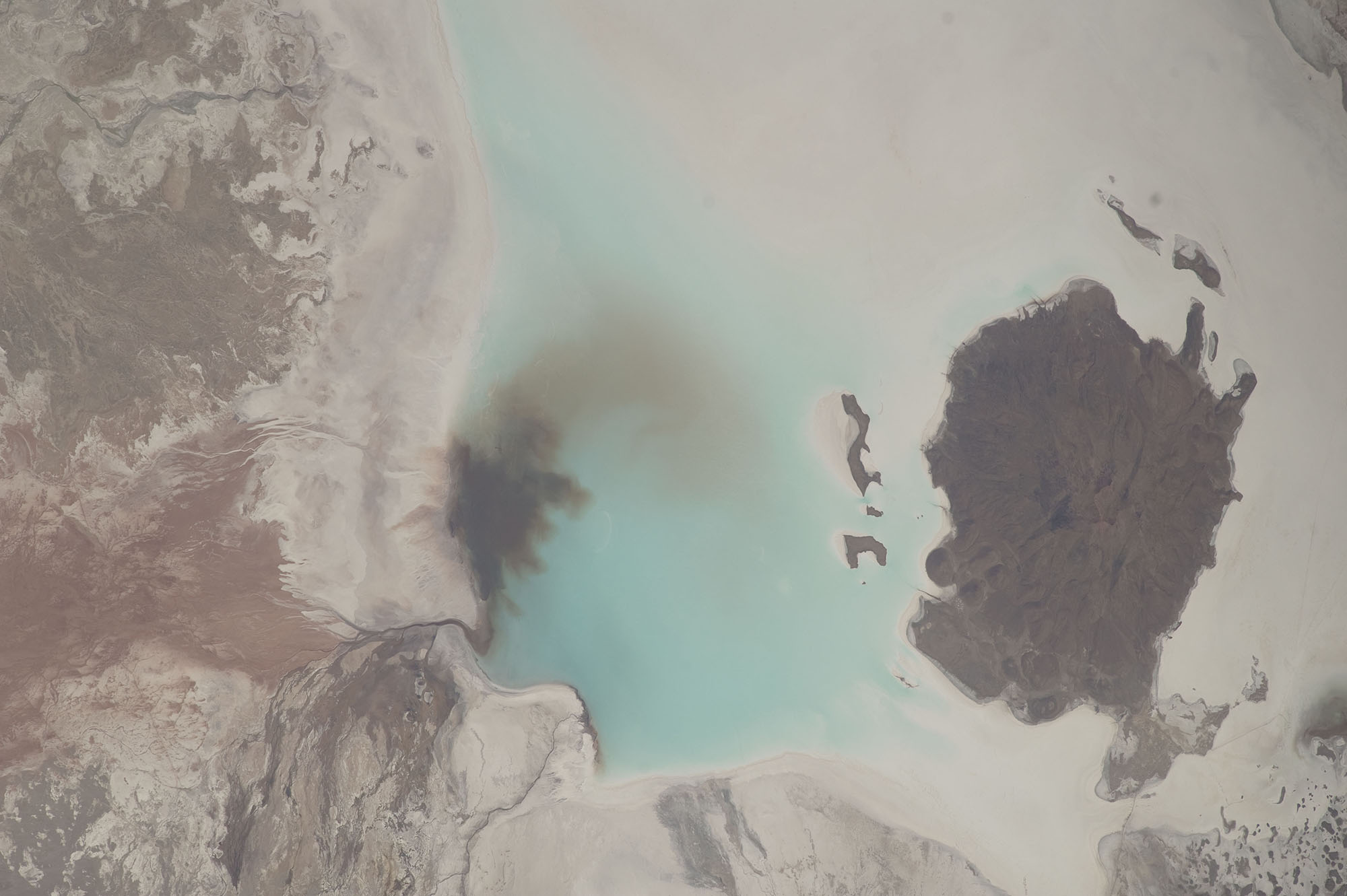
A
picture of the Coipasa salt flats in Bolivia, photographed by an
Expedition 33 crew member on the International Space Station. (Photo:
Nasa)
International
seminar
Then, in March 2020,
four months after the coup, the British embassy in La Paz partnered
with the regime’s Ministry of Mining to organise an “international
seminar” for more than 300 officials from the global extractives
sector.
A British company,
Watchman, was brought in by the UK embassy to give the keynote
presentation and outline the “creative solutions” it had enacted
in Africa to bring local communities onside with mining projects.
The Foreign Office
documents note: “Watchman UK and other consultancies are now in
line to offer services in this important field to a number of Bolivia
mining companies who wish to achieve win-win solutions to their
controversies with indigenous inhabitants and towns located in the
area of influence of their activities”.
Watchman is a risk
management company set up in 2016 by Christopher Goodwin-Hudson,
a nine-year veteran
of the British Army who was later executive director of global
security for the investment bank Goldman Sachs.
The company supports
corporate clients “across the extractive, agribusiness and capital
project sectors” who are having trouble operating because of local
resistance. Watchman’s website carries
the logo of the UK Foreign Office.
The firm’s associate
director, Gabriel Carter, has held a number of senior
roles in the private security industry and in 2012 founded an
Afghanistan-focused security company that “supported numerous
British and US development projects”.
Carter, also a veteran
of risk management at Goldman Sachs, is a member
of the Special Forces Club, an exclusive and secretive private
members’ club for senior intelligence and special forces veterans
in Knightsbridge, London.
Watchman did not
respond to Declassified’s
questions about the event and the UK Foreign Office refused to answer
questions related to it.
Voor deze documenten waar ik vreemd genoeg geen werkende link kan maken naar het PDF zie het origineel op Declassified UK. (en veiligheidsgordels vast voor je gaat lezen!!)
UK Foreign Office
documents from 2015-20 documenting a range of programmes run by the
British embassy in Bolivia.
A long courtship
The quick moves of the
British embassy on the lithium project followed years of trying to
court Bolivia’s socialist government over the country’s reserves
of the metal, the new documents show.
Morales had moved
Bolivia away from the country’s traditional reliance on Western
corporations since taking power in 2006. His government was widely
praised for reducing
poverty and increasing investment in schools, hospitals and
infrastructure.
The Foreign Office
notes that its “first engagement with the Bolivian Lithium
Company”, known by its Spanish acronym YLB, was in 2017-18 when it
paid £31,500 to organise a scientific UK mission. It focused on
training the YLB on new technologies to explore and produce lithium
in a “sustainable” way.
The documents note
this project “allowed British organisations … to carry over
projects on lithium in Bolivia with [Inter-American Development Bank]
and [UK government] funding in the following years”.
The UK government
noted: “Relationship with the Bolivian Lithium Company might also
prove relevant as Bolivia becomes a supplier of lithium (a critical
material) to the UK”, and referenced its “effort to connect
Bolivia, Chile and Argentina (ie the Lithium Triangle) with the
London Metal Exchange”.
The following year’s
programme notes that “stronger links” developed between the YLB
and the British embassy in Bolivia.
The documents also
outline how in April 2019, the British embassy in Buenos Aires,
Argentina, hosted a “high-level technical meeting” with the
mining and lithium authorities of Argentina, Chile and Bolivia, as
well as senior representatives of the London Metal Exchange.
Those three countries
together share ownership of the “lithium triangle”, the region of
the Andes rich in lithium reserves. At the time Argentina and Chile
had right-wing governments friendly with the UK.
Also in attendance was
Bolivia’s vice-minister of lithium and the chief executive of YLB.
“The project from the British Embassy in Bolivia … consisted in
securing and facilitating the presence of the Bolivian authorities in
the meeting”, the Foreign Office documents note.
It added that, after
the meeting, the Bolivian government was now “aware of the
relevance of the London Metal Exchange” and particularly “its
interest to establish a lithium standard” which was to be based
upon the lithium triangle production. Such standards serve
“to promote understanding and communication between metal producers
and users”.
The following sections
in this passage are redacted under two exemptions related to
“international relations” and “commercial interests”. These
are the only redactions made on the programme documentation for the
five years of operations seen by Declassified.

The
London Metal Exchange, the world centre for industrial metals
trading. (Photo: UK government)
Darktrace
There is further
evidence Britain was always priming the country for a change in
government. In the year before the coup, the British embassy was
promoting the UK cyber sector, bringing a company to Bolivia founded
by the UK intelligence community, and with close links to America’s
Central Intelligence Agency (CIA).
In 2009, Morales had
expelled
a US diplomat who he claimed was a CIA asset heading an operation to
infiltrate Bolivia’s state-owned oil company.
Eight months before
the coup, the UK embassy spent more than £4,500 organising a “major
event” in Laz Paz on cybersecurity for financial institutions,
attended by 150 executives and senior officials from the Bolivian
financial sector, according to the Foreign Office documents.
Delivered in
coordination with the Bolivian Stock Exchange, Bolivian banks were
said to “now be acquiring specialised services to protect their
systems from cybercrime”. Further, the bankers were now aware that
fighting cybercrime had to be “based upon adequate and
state-of-the-art technology”.
Presentations were
delivered by British company Darktrace, a cybersecurity firm set
up by Britain’s domestic security service, MI5, and its signals
intelligence agency, GCHQ. The company was incorporated
the day after the first of whistle-blower Edward Snowden’s
exposures was published in The
Guardian.
Since its founding,
Darktrace has hired personnel from the US intelligence community,
including directly
from the CIA and the National Security Agency, where Snowden used to
work.
Recruits from
the CIA
Alan Wade, who sits on
Darktrace’s advisory council, is a 35-year veteran
of the CIA and its former chief information officer.
Darktrace also
recruited Marcus Fowler, a former US Marine and 15-year veteran
of the CIA, as its “director of strategic threat”. At the CIA,
Fowler worked on “developing global cyber operations and technical
strategies” and “conducted nearly weekly briefings for senior US
officials”, he
says.
In July 2013, Evo
Morales’ presidential plane was grounded
in Austria after US intelligence agencies suspected it had Snowden on
board.
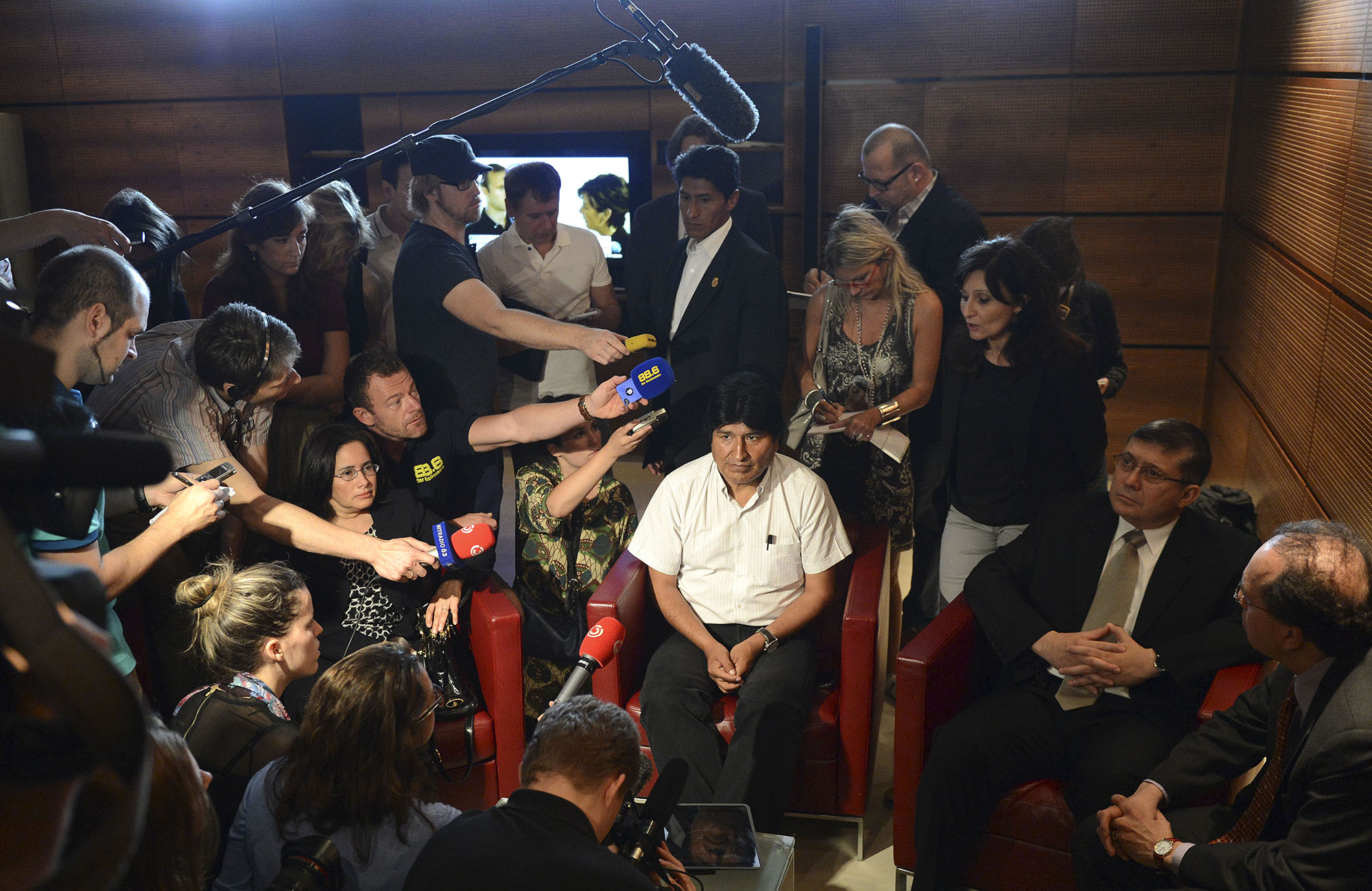
Bolivian
President Evo Morales (C) speaks to the media at the airport in
Vienna, Austria, 3 July 2013. Morales’ plane landed in Vienna after
the aircraft was denied access to French and Portuguese airspace over
suspicions that US whistleblower Edward Snowden was on board. (Photo:
Helmut Fohringer/EPA)
Morales blamed
the US and other international actors for the November 2019 coup. “It
was a national and international coup d’état,” he said soon
after. “Industrialised countries don’t want competition.” He
added: “I’m absolutely convinced it’s a coup against
lithium.”
The WikiLeaks
diplomatic cables show
that the US embassy in La Paz worked closely with the political
opposition in Bolivia to remove the Morales government after it took
power in 2006.
Morales expelled the
US Drug Enforcement Agency in 2008
and the US Agency for International Development in 2013,
accusing them of “conspiring” against his government.
For the March 2019
event, the UK embassy also brought an expert from the London-based
think tank Chatham House, whose co-president is Eliza
Manningham-Buller, a former director-general of MI5.
Its funders include
the US State Department, UK Foreign Office, the British Army, and the
oil companies BP and Chevron.
After the event,
Britain’s Foreign Office noted that “several companies in the
field [are] now being hired and consulted”. It is not known if
Darktrace was one of them.
The embassy kept up
the engagement soon after. “New dialogue with the Bolivian
government on cyber”, notes the Foreign Office in its 2019-2020
programme. It is unclear if this referred to the coup regime.
‘Important
input’
The day after the
Bolivian election on 20 October 2019, the Washington-based
Organisation of American States – the grouping of countries in
North and South America – released a report
on the vote which Morales had marginally won. It cited “an
inexplicable change” that “drastically modifies the fate of the
election”.
It also raised doubts
about the fairness of the vote and fuelled a chain of events that led
to the November coup.
However, a subsequent
study by independent
researchers using data obtained by The
New York Times
from the Bolivian electoral authorities found that the OAS
statistical analysis was flawed.
Its conclusion that
Morales’ share of the vote jumped inexplicably in the final ballots
relied on incorrect data and inappropriate statistical techniques,
the researchers found.
Declassified
can now reveal that the British embassy provided data for the OAS’s
discredited report.
The British embassy
spent £8,000 putting together an alliance of civil society
organisations which “coordinated an operation for citizens’
observation of the elections in 2019”.
This alliance carried
out a survey on voting intentions before the elections, which “was
an important input for the OAS mission report, which identified
irregularities in the process”, the Foreign Office notes.
The OAS failed to
respond to Declassified’s
questions about the UK embassy’s role in its discredited report and
the Foreign Office refused to answer any questions about it.
The British embassy’s
projects to prepare for the election went even further. In February
2019, it spent £9,981 to bring the Thomson Reuters Foundation to the
country to train 30 Bolivian journalists on “verification
techniques and pre-planning an election on coverage that is balanced,
accurate and free of polarisation”.
The Foundation said
that “ahead of the elections in Bolivia” it was teaching
“practical skills and tools to recognise fake news and attempts to
influence the electorate with false information”.
Declassified
previously
revealed
how the British government is using journalism as an influencing tool
in Latin America. Also recently revealed
was that the British government secretly funded Reuters in the 1960s
and 1970s at the behest of an anti-Soviet propaganda unit linked to
British intelligence.
‘Marxist
solidarity’
Days after the
November coup in Bolivia, the UK Foreign Office released a statement
saying: “The United Kingdom congratulates Jeanine Áñez on taking
on her new responsibilities as interim President of Bolivia.” It
added: “We welcome Ms Áñez’ appointment and her declared
intention to hold elections soon.”
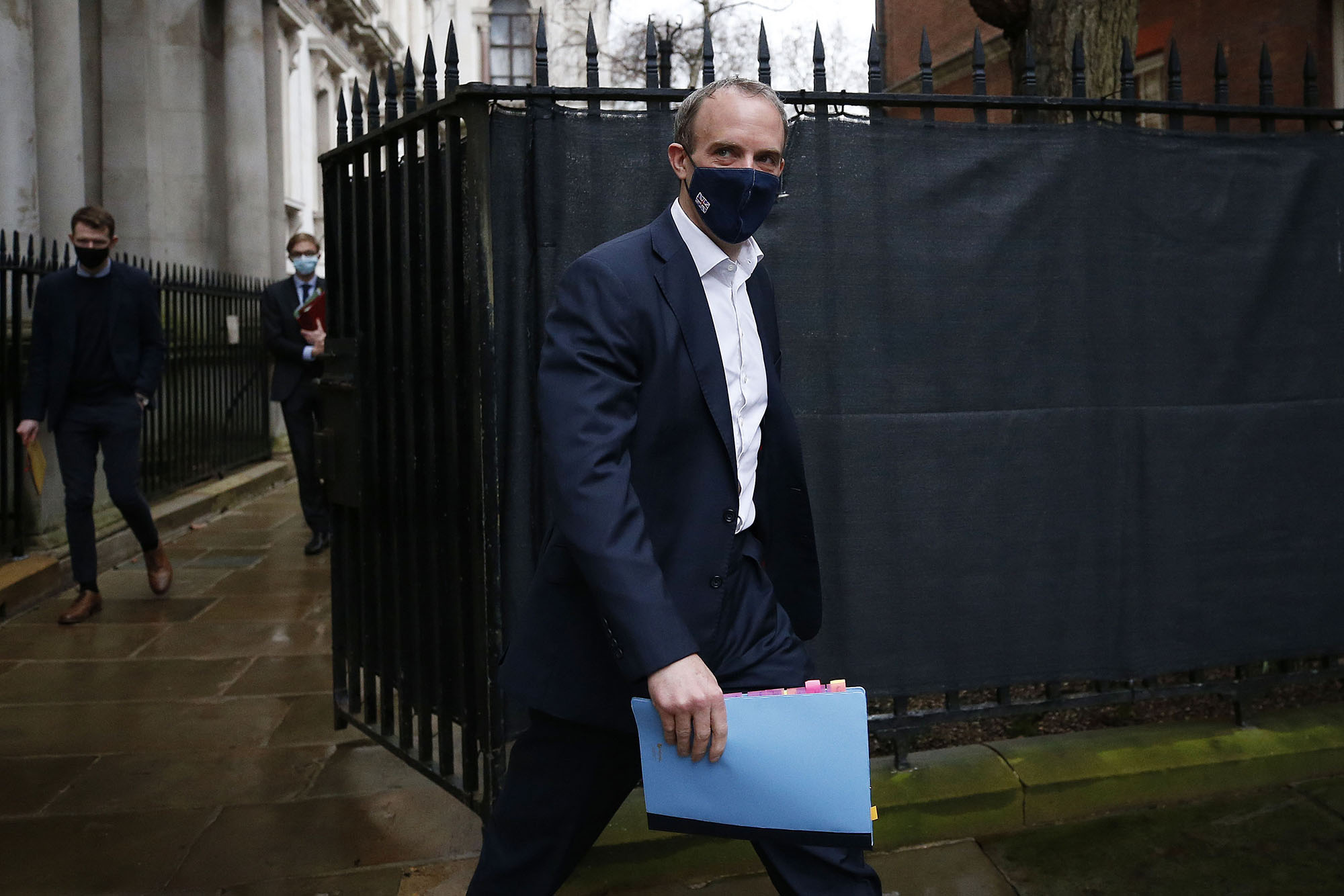
UK
Foreign Secretary Dominic Raab arrives at 10 Downing Street on 3
February 2021 in London. (Photo: Hollie Adams / Getty Images)
Foreign Secretary
Dominic Raab stated:
“We hope that the current crisis in Bolivia can now be resolved
swiftly, peacefully and in a democratic way. The Bolivian people
deserve to have the opportunity to vote in free and fair elections.”
Then Labour leader
Jeremy Corbyn offered a completely different view, saying:
“I condemn this coup against the Bolivian people and stand with
them for democracy, social justice and independence.”
Raab proceeded to
attack Corbyn, quote-tweeting him and stating:
“Unbelievable. The Organisation of American States refused to
certify the Bolivian election because of systemic flaws. The people
are protesting and striking on an unprecedented scale. But
@jeremycorbyn puts Marxist solidarity ahead of democracy.”
But Raab and the
Foreign Office made no further comments as the new regime’s forces
carried out the Sacaba and Senkata massacres the following week.
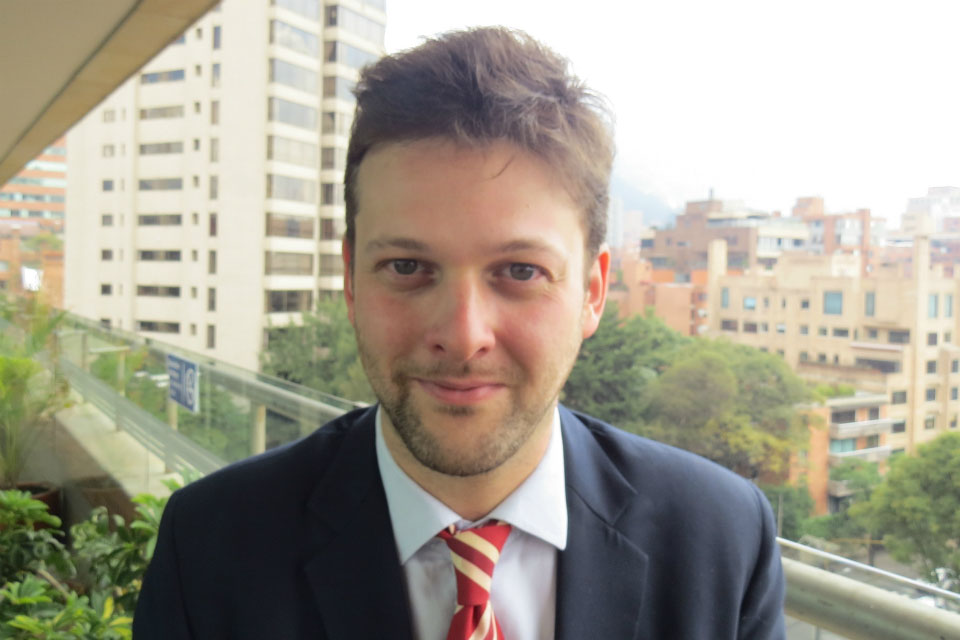
Jeff
Glekin, Britain’s ambassador to Bolivia since January 2019. (Photo:
UK government)
In March 2020, four
months after Morales was overthrown, the new regime was organising a
series of new initiatives “with the UK as a strategic partner”,
the documents note.
That same month,
Britain’s ambassador during the coup, Jeff Glekin, offered a
glimpse of the UK interests involved in backing the new regime.
Glekin spoke
to the Bolivian media about British Week, which was bringing 12
British companies to the country for the first time.
“Many are looking
for new markets in the world and Bolivia can be an opportunity to
grow,” he said. “Due to the political changes in Bolivia, a more
open environment for foreign investment is perceived and I believe
that this will open new doors to companies that want to share their
technology, their products and make alliances with different
companies.”
Glekin, who remains in
post, added: “We are working with the Santa Cruz Mayor’s Office …
and we invite Santa Cruz corporations to participate in the event.”
In the documents seen
by Declassified,
a disproportionately high number of UK embassy projects have focused
on the eastern city of Santa Cruz, which was the centre of opposition
to Evo Morales’ government.
Glekin continued: “The
previous government was not very in favour of foreign investment. So,
with the changes that we are going to see, it will be easier to enter
the market and do business. The companies to come are from different
parts of Great Britain and from various sectors. They are modern
firms that are doing innovative things and want to enter the market
and share their services and products in Bolivia.”
Glekin added: “The
demand for lithium is growing and Bolivia must take advantage of that
opportunity.”
When new elections
took place in October 2020, Evo Morales’ Movimiento
al Socialismo
won 55%
of the votes against six rivals on the ballot, easily avoiding the
need for a runoff. The runner-up was former President Carlos Mesa
with just under 29%.
A Foreign Office
spokesperson told Declassified:
“Presidential elections held in Bolivia in October 2020 were free
and fair. There was no coup. The UK has a strong and constructive
relationship with current and former Bolivian administrations.” DM
Matt Kennard is
head of investigations at Declassified UK, an investigative
journalism organisation that covers the UK’s role in the world.
Follow
Declassified onTwitter,Facebook
andYouTube.
Sign up to receive Declassified’s monthly newsletterhere.
You can become a member and supporter of Declassified by visiting
here.
Click for
Spanish,
German,
Dutch,
Danish,
French,
translation- Note- Translation
may take a moment to load.
========================================
* Zie ook wat Edwin
Koopman heeft durven zeggen over deze
coup: ‘Bolivia: een jaar na de coup wint de socialistische partij alsnog de verkiezingen‘ Met daarin hetvolgende plus link naar een bericht van Trouw met daarin een voorbeeld van foute berichtgeving over Bolivia,
geschreven door de neoliberale fantast Edwin Koopman (werkt ook voor de
VPRO) die een uiterst gekleurd verslag
gaf over de situatie voorafgaand aan de verkiezingen in Bolivia, waarbij
hij verzweeg dat de OAS de coup van 2019 organiseerde op
basis van de uitslagen (waarbij Koopman de overwinning van Morales als
dubieus durfde neer te zetten) Zie ook andere fratsen van Koopman door
op het label met zijn naam te klikken, direct onder dit bericht….): ‘Bij de verkiezingen in Bolivia worden de kandidaten met stenen bekogeld en gaan aanhangers met elkaar op de vuist‘
Zie verder ‘Bolivia: de coup is voorbij, tijd om secretaris-generaal Almagro van de OAS af te zetten en te berechten‘
‘Amnesty, Human Rights Watch, en massamedia doodstil over moord op journalisten in Bolivia‘
‘Bolivia: CIA en OAS hebben op valse gronden een coup tegen de Boliviaanse president Morales opgezet‘
‘Bolivia: OAS heeft gelogen over verkiezingen: Evo Morales onterecht afgezet middels staatsgreep!‘
‘Bolivia: de coup heeft alles te maken met grondstoffen‘
‘NOS liegt weer over Evo Morales (Boliviaanse president) die met coup werd afgezet‘
‘Bolivia coup een ‘CIA job’, aldus anonieme Duitse veiligheidsanalist, met lessen voor de toekomst‘
‘Bolivia: misdadigers die vechten voor het kapitalisme‘
‘NOS met fake news over Bolivia‘
‘Bolivianen eisen hun president terug‘
‘Bolivia: staatsgreep maakt eind aan succesvol presidentschap Evo Morales‘
‘Bolivia: bewijs op tafel dat VS aanstuurt op een coup”
Bolivia’s Evo Morales ‘unhurt’ after helicopter emergency landing
Bolivia Closes 2018 Among The Highest Economic Growth Rates
Bolivia’s Remarkable Socialist Success Story: President Evo Morales has transformed his country’s economy with an unapologetically left-wing agenda.
‘NAVO gaat VS helpen in Zuid-Amerika terreur uit te oefenen: Colombia lid van de NAVO……..‘
‘VS couppleger in Venezuela belooft VS Venezolaanse olie als hij de macht heeft overgenomen‘
‘Halliburton en Chevron hebben groot belang bij ‘regime change’ in Venezuela‘ (zie de links in dat bericht naar meer artikelen over Venezuela)
‘9 ‘ex-FARC rebellen’ vermoord door leger Colombia: FARC-EP opgericht‘
‘Koenders heeft vrijlating gegijzelde Spoorloos makers in Colombia bewerkstelligt……. AUW!!!‘
‘Paus Franciscus in Colombia om vrede te prediken……‘
‘People of Brazil: my sincere condolences with ‘your’ fascistic, psychopathic president Bolsonaro……‘
‘VS commando’s vechten o.a. in Midden- en Zuid-Amerika, aldus het VS ministerie van oorlog………‘
‘NAVO naar Zuid-Amerika? Weg met dit agressieve, terroristische bondgenootschap, NU!!!‘
‘Bolton geeft toe dat de VS een fascistisch beleid voert……‘
‘Bolsonaro wint Braziliaanse verkiezingen >> weer zijn we een fascistisch geleid land ‘rijker…’‘
‘Braziliaanse verkiezingen: democratie versus (neo-) fascisme, ook een groot gevaar in Europa‘
‘Katy Sherriff (Radio1 correspondent Z-Amerika) brandt socialistische partij Brazilië af……‘ (Sherriff was destijds correspondent voor de zogenaamd onafhankelijke NOS (!!), ze beschuldigde o.a. Lula da Silva, de voormalige socialistische president van Brazilie af als corrupt, toevallig werd afgelopen week, het is nu 13 maart 2021, bekend gemaakt dat Lula is vrijgesproken door het Hooggerechtshof in Brazilie!! Sherriff is nu werkzaam voor…: Amnesty International >> hoe is het gvd mogelijk..??!!!)

